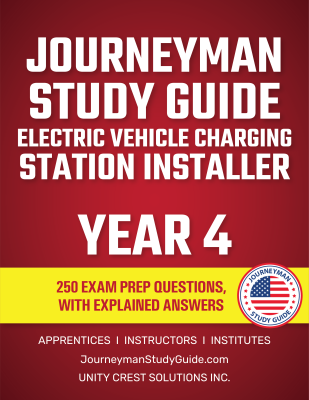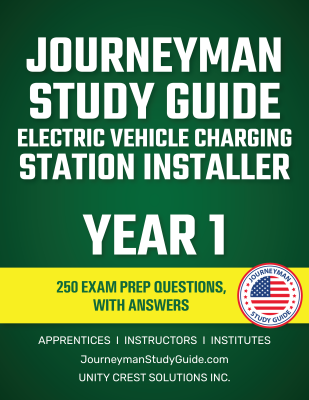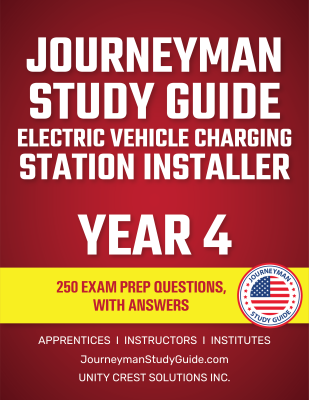Questions, Answers, & Explanations
Get clear explanations behind every answer, perfect for deeper learning and more thorough exam preparation.
Site Updates in Progress: Things might look different as we work on enhancing your experience.
What is an Electric Vehicle Charging Station Installer?
Electric Vehicle (EV) Charging Station Installers are licensed electricians who specialize in installing, maintaining, and repairing EV charging infrastructure in residential, commercial, and public locations. As EV adoption grows across the U.S., these professionals play a crucial role in expanding the nation’s charging network, supporting clean energy initiatives, and ensuring compliance with electrical and energy regulations.
Key Responsibilities
EV Charging Station Installers handle the electrical and structural aspects of charging station deployment. Their responsibilities include:
Skills and Traits for Success
To excel in this trade, EV Charging Station Installers need:
Industries Where EV Charging Station Installers Thrive
As demand for electric vehicles continues to rise, EV Charging Station Installers are needed in various industries:
Why Choose This Career?
EV Charging Station Installers benefit from a high-growth industry, competitive wages, and long-term career stability.
Prepare for an EV Charging Installation Career
Mastering electrical safety, load management, and smart charger integration is key to success. Our Q&A study guides, online practice exams, and certification prep resources help aspiring EV Charging Station Installers build the skills needed for certification.
What to Expect on the EV Charging Station Installer Certification Exam
The EV Charging Station Installer Certification Exam evaluates a candidate’s ability to install, maintain, and troubleshoot electric vehicle charging stations while ensuring compliance with National Electrical Code (NEC) and safety regulations. Many states and employers require certification to verify an electrician’s expertise in EV infrastructure.
Exam Format
The certification exam includes both theoretical knowledge and hands-on practical assessments:
Key Topics Covered
Passing Requirements
Most certifying bodies require a minimum score of 70% on the written exam. The practical assessment evaluates an installer’s ability to safely and correctly install a charging station according to NEC and OSHA guidelines.
Exam Preparation Tips
Get Ready to Pass Your Exam
Our Q&A study guides, detailed explanations, and online tests help you build confidence and prepare for the EV Charging Station Installer Certification Exam.
What Types of Questions Are on the EV Charging Station Installer Certification Exam?
The exam assesses technical skills, electrical safety protocols, and industry best practices for EV charging installations.
Common Question Formats
Sample Questions
Study Smarter, Pass Faster
Our Q&A products break down complex topics, while our Online Tests provide real-time performance tracking.
What Is It Like to Work as an EV Charging Station Installer?
Electric Vehicle (EV) Charging Station Installers play a vital role in the clean energy sector, ensuring that homes, businesses, and public areas have reliable access to EV charging infrastructure. Their workday consists of site assessments, electrical installations, and system testing, often involving collaboration with electricians, utility providers, and local authorities.
Morning: Job Preparation & Safety Checks
Midday: Installation & Troubleshooting
Afternoon: System Testing & Final Inspections
Challenges & Rewards
Ready to Start Your Career?
Prepare for your certification with our study guides, Q&A products, and interactive online tests designed for EV Charging Station Installers.
What Are the Long-Term Benefits of a Career in EV Charging Installation?
With the rapid expansion of electric vehicles and clean energy initiatives, skilled EV Charging Station Installers have a high demand for their expertise, competitive wages, and opportunities for career advancement.
Career Progression
Top Employers & Career Opportunities
Union & Certification Benefits
Why This Career Matters
As the U.S. moves toward sustainable transportation, certified EV Charging Station Installers will be essential in building the future of clean energy.
Take the Next Step
Advance your career with our study guides, Q&A materials, and interactive online tests tailored for EV Charging Station Installers.
How Much Can You Earn as an EV Charging Station Installer?
EV Charging Station Installers earn competitive wages due to high demand, specialized skills, and the rapid expansion of EV infrastructure in the U.S. Salaries vary based on experience, certification, and location.
General Wage Ranges
Regional Salary Differences
Factors That Impact Wages
Want to Boost Your Earning Potential?
Advance your career with our study guides, Q&A products, and interactive online tests to enhance your skills and increase your wages.
Essential Tools for EV Charging Station Installers
Recommended Training Programs
Get Equipped for Success
Prepare for certification with our study guides, Q&A resources, and interactive online tests tailored for EV Charging Station Installers.
Where Can You Learn EV Charging Installation?
Training for EV Charging Station Installers is offered through technical schools, union apprenticeships, and industry certification programs. These programs provide hands-on electrical training, safety education, and regulatory compliance knowledge.
Types of EV Charging Installation Programs
What to Expect in Training Programs
Choosing the Right Training Program
Start Your Training for EV Charging Installation
Get certified in EV infrastructure and electrical safety with our Q&A study guides, online practice exams, and certification prep resources.
Why Join a Union or Work with Leading Employers?
Union membership and employment with established EV infrastructure companies provide higher wages, job security, and specialized training.
Benefits of Union Membership
Top Unions for EV Charging Station Installers
Leading Employers Hiring EV Charging Installers
What Employers Look For
How to Get Hired as an EV Charging Installer
Why Unions & Employers Matter
Unions and top employers offer stability, strong wages, and industry-leading training programs to EV Charging Station Installers.
Secure the Best Career Opportunities
Enhance your employability by getting certified and joining a union. Use our study guides, Q&A materials, and online tests to ensure success in the EV charging industry.
How to Stay Ahead in the EV Charging Installation Industry
The EV charging industry is rapidly evolving, driven by government incentives, renewable energy integration, and advancements in smart charging technology. Staying competitive requires continuous learning, professional networking, and adapting to new technologies.
Emerging Trends in EV Charging Installation
Best Practices for Professional Growth
Challenges & Opportunities in the Industry
Staying Competitive in the Job Market
Success in the EV charging industry depends on technical expertise, adaptability, and ongoing certification. Our Q&A study materials, Q/A Explanation guides, and interactive online tests help professionals reinforce knowledge and prepare for certification.
Get clear explanations behind every answer, perfect for deeper learning and more thorough exam preparation.
Quick and easy practice to test your knowledge anytime, anywhere—ideal for simple, on-the-go preparation.










